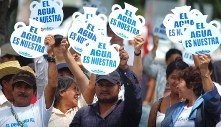Activists in El Salvador are currently fighting against the potential privatization of water in their country. Many areas of the country are dependent upon unrestricted access to local wells in order to obtain potable water. If water were to be privatized, many Salvadorans would lose their access to clean drinking water, as the costs of water as a market-based commodity would exceed the means of the majority of Salvadorans.
Current government data shows that 90% of the country’s surface water is irreparably polluted, and 1.5 million Salvadorans lack access to potable water. Andrés McKinley, a mining and water specialist at the University of Central America, spoke to the diren nature of the situation: “We are reaching the crisis level of having 1,700 cubic meters of freshwater per capita, while Guatemala and Nicaragua have between 15,000 and 30,000!” Without unrestricted access to clean drinking water, the human rights situation in El Salvador could take a sharp turn for the worse.
The leftist political party, Farabundo Martí National Liberation Front (FMLN), has supported environmental organizations and the broader social movement, seeking to protect water as the vital resource that it is and to ensure its equitable distribution through the proposed “General Water Law,” which was originally introduced in 2006. The General Water Law would, among other goals, define and protect water as a human right, as well as ensure universal access for the population and integrate community consultation into national decision-making regarding water usage.
The FMLN has coordinated with the National Water Forum to introduce an updated version of the law in 2013 in the Environmental and Climate Change Commission of the Legislative Assembly. With this cooperation, the debate over water regulation pushed forward, with ninety-two articles approved before the discussions were stopped by the opposition, who insisted that the private sector be included in the new regulatory bodies the General Water Law was proposing.
The right-wing Nationalist Republican Alliance (ARENA) party is instead proposing a “Comprehensive Water Law,” which would bring corporate entities into the management of the country’s water system. Since the right-wing’s proposal, protests in rejection of their proposal have been near-constant. Despite these protests, the right-wing parties obtained a supermajority in the legislature following the 2018 elections, and are moving forward quickly in taking steps to pass their bill.
Despite the right-wing parties’ efforts, opposition to their bill remains strong, with numerous entities taking public positions against the proposed law. For instance, the Catholic Church has also been outspoken in their support for community partnerships in the regulation and usage of water, and against the privatization of water by large corporations. The Catholic Church and the Jesuit-run University of Central America (UCA) produced a study on water management in Latin America, which was then delivered to Salvadoran lawmakers as Congress considered the Comprehensive Water Law.
The study, which was drafted in 2017 by Costa Rican specialist Lilian Quezada with support from UCA, shows that most Latin American countries have a state regulatory body that manages water with a focus on the citizens’ common good. UCA chancellor Andreu Oliva added that the report will allow members of Congress’ Environment and Climate Change Commission to get a “better overview of the importance of water being managed by public entities, as opposed to the private sector.”
San Salvador Archbishop José Luis Escobar Alas said that the Salvadoran Catholic Church will continue to defend the rights of the country’s poor, demanding a “fair, efficient and equal water law.”
The bishops of El Salvador have also taken a stand in urging lawmakers to oppose any plans for privatizing water, saying the poor could not afford to pay the cost of a vital necessity. In a statement issued in June and titled, “We will not allow the poor to die of thirst,” the Salvadoran bishops’ conference cited Pope Francis’ encyclical “Laudato Si’,” which states, “Access to potable and secure water is a basic, fundamental and universal human right because it determines the survival of people and therefore is a condition for the exercising of all other rights.”

